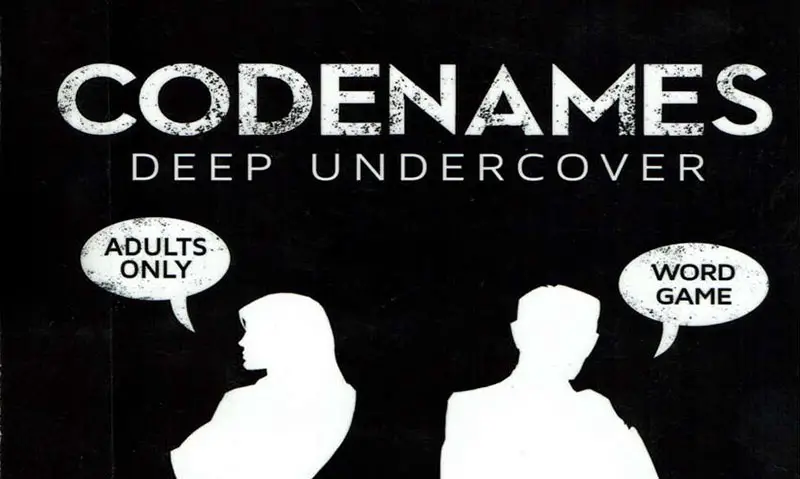
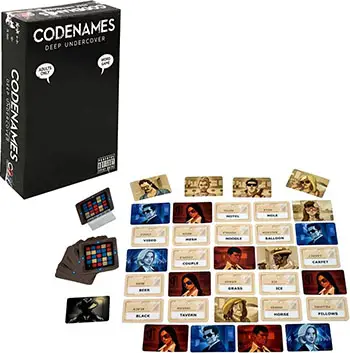
Components
- 16 agent cards
- 1 double agent card
- 7 innocent bystander cards
- 1 assisin card
- 40 key cards
- 1 card stand
- 195 cards with 390 codenames
- 5 DIY codename cards
- Instructions
Setup
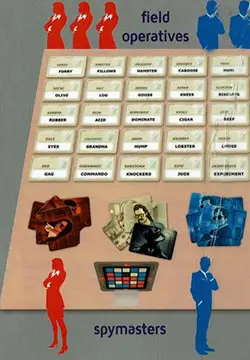
Players split up into two teams of similar size and skill. You need at least 4 players for a standard game.
Each team chooses one player to be their spymaster. Both spymasters sit on the same side of the table.
The other players, or field operatives, sit across from their spymasters.
Randomly deal 25 codenames between the two teams.
Each team take turns placing 1 codename on the table until a total of 25 codename cards are placed in a 5-by-5 grid. The remaining cards aren't used in the game.
Tip: While shuffling the codename cards, be sure to flip over half the deck every so often. This will mix the words more thoroughly).
The Key
Each game has one key that reveals the secret identities of the cards on the table. The spymasters should choose the key card randomly and slide it into the stand between them.
Any side can be up. Preferably don't think about it; just slide it into the stand. Do not let the field operatives see it.
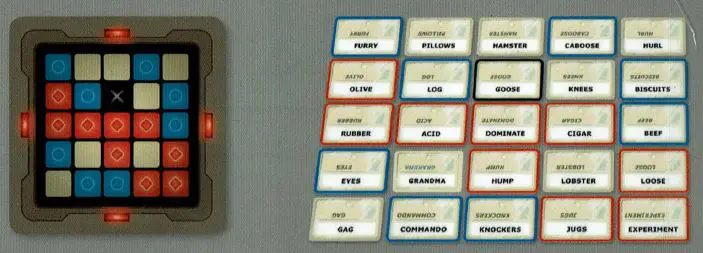
The key corresponds to the 5 x 5 grid on the table. Blue squares correspond to words that the Blue Team must guess (blue agents). Red squares correspond to words that the Red Team must guess (red agents).
Pale squares are innocent bystanders, and the black square is an assassin who should never be contacted at all!
Starting Team
The four lights around the edge of the key card indicate which team starts. The starting team has 9 words to guess; the other team has 8. The starting team will give the first clue of the game.
Object of the Game
Spymasters know the covert identities of all 25 agents and bystanders. Their teammates know the agents only by their codenames.
Spymasters take turns giving one-word clues. A clue may relate to multiple words on the table. The field operatives try to guess which words their spymaster meant.
When a field operative touches a codename, the spymaster reveals its secret identity - agent, bystander, or assassin. If the operatives successfully identify one of their team's agents, their team may keep guessing. Otherwise, it is the | other team's turn. The first team to contact all their agents wins the game.
Game Play
Teams take turns. The starting team is indicated by the 4 lights on the edges of the key card.
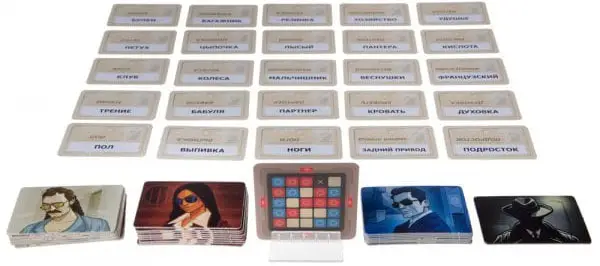
Giving a Clue
If you are the spymaster, your job is to provide a one-word clue that relates to some of the codenames your team is trying to guess.
Once you think you have a good clue, say it aloud. You also say one number, which tells your teammates how many codenames are related to your clue.
Example: Two of your words are WHISKEY and VODKA. Both of these are alcoholic drinks, so you say alcohol: 2.
You are allowed to give a clue for only one word (martini: 7), but it's fun and ambitious to try for two or more. Getting four codenames with one clue is a big accomplishment.
One Word
Your clue must be one word only. You are not allowed to give extra hints. For example, don't say, "This may be a bit of a stretch..". You are playing Codenames Deep Undercover.
It's always a bit of a stretch. Your clue cannot be any of the codenames currently visible on the table. On later turns, some codenames will be covered up, so a clue that is not legal now might be legal later.
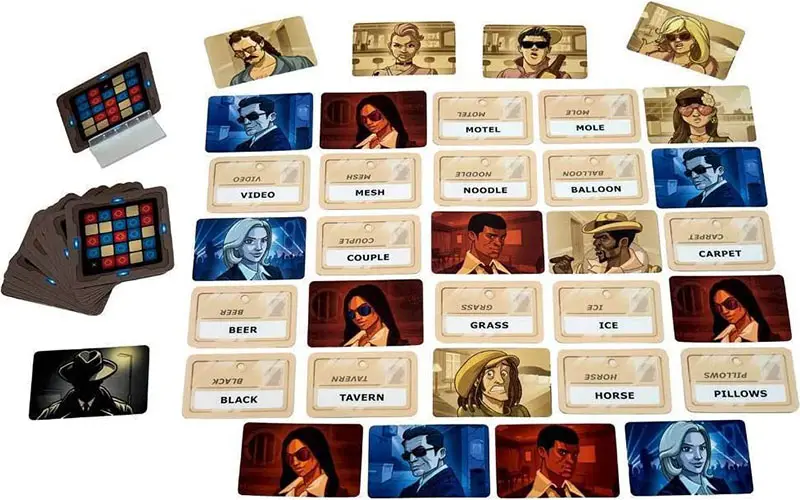
Making Contact
When the spymaster gives a clue, his or her field operatives try to figure out what it means. They can debate it among themselves, but the spymaster must keep a straight face. The operatives indicate their official guess when one of them touches one of the codenames on the table.
If the field operative touches a card belonging to his or her team, the spymaster covers the word with an agent card in that color. The team may guess another word.
If the field operative touches an innocent bystander, the spymaster covers it with an innocent bystander card. This ends the turn.
If the field operative touches a card belonging to the other team, the word is covered by one of the other team's agent cards. This ends the turn. (It also helps the other team).
If the field operative touches the assassin, the word is covered by the assassin card. This ends the game! The team that contacted the assassin loses.
Tip: This is why it's critical for the spymaster not to give any clues that relate to the assassin. Always double-check.
Disruptive commentary from the opposing team is permitted. Even encouraged.
Number of Guesses
The field operatives must always make at least one guess. Any wrong guess ends the turn immediately, but if the field operatives guess a word of their team's color, they can keep guessing.
Operatives can stop guessing at any time. In practice, though, you want to guess as many words as the spymaster's provided number. You might even want to guess one more:
Example: Red Team's first clue was butt: 2. The red operative wanted to guess CABOOSE and BOTTOM. She guessed CABOOSE first. That was an innocent bystander, so the Red Team's turn is over and the red operative did not get a chance to guess BOTTOM.
Blue Team took a turn and correctly guessed two words. Now, it is Red Team's turn again.
The red spymaster says booze: 3. The red operative is pretty sure that MARTINI is booze, so she touches that card. The spymaster covers it with a red agent card, so she gets to go again. VODKA is also booze, so she touches that codename. It's also red, so she can go again.
She's not sure of the third booze word. She picks BOTTOM. This has nothing to do with BOOZE. She is guessing a word from the previous clue (butt: 2).
BOTTOM is a red word. The operative has made 3 correct guesses for the clue booze: 3. She is allowed one final guess. She can try to find the third booze word, or she can try to find the other butt word. Or she can stop at three and let Blue Team have a turn.
You are allowed only one extra guess. In the example above, the red operative would be allowed 4 guesses because her spymaster said the number 3. When the field operatives say they are done guessing (or when they guess wrong) it is the other team's turn.

Game Flow
Spymasters take turns giving clues. Each turn covers up at least one word, which makes guessing progressively easier.
Penalty for Invalid Clue
If a spymaster gives an invalid clue, the team's turn ends immediately. As an additional penalty, the other team's spymaster may cover one of his or her words with an agent card before giving the next clue.
But if no one notices that a clue is invalid, it counts as valid.
Keeping a Straight Face
The spymaster is expected to keep a straight face. Do not reach for any card while your ' teammates are considering the words.
When a teammate touches a word, consult the key card, and cover the word with the card of the corresponding color. When a teammate chooses a word of the correct color, you should act as though it was exactly the word you meant, even if it wasn't.
If you are a field operative, focus on the table when you are making your guesses. Do not make eye contact with the spymaster while you are guessing. This will help you avoid nonverbal cues.
When your information is strictly limited to what can be conveyed with one word and one number, you are playing in the spirit of the game.
Blank Cards
Undoubtedly, your minds can go to places we can't. So, we've included blank cards for you to offer a deep, dark, personal touch to your game.
The Innocent Bystanders
-
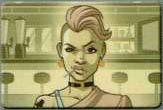
Leigh Vatipp - Bartender: "I don't do lap dances".
Leigh tends bar at the Diamond Club, a venue for showgirls. She spends most of her time reminding patrons that she pours the drinks and doesn't give lap dances.
Her signature drinks include the Absinthe-Minded Professor and the alluring Kaiser Beef.
-
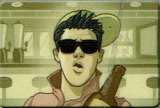
Wayne Kerr (aka 'Brofessor') - Lifetime Student: "Dude, when is Spring Break this year?"
In his 7th Year as a student at the State College, Wayne been there so long that the student body thinks he's part of the faculty. He's twice been voted the 'Coolest Professor on Campus.'
-
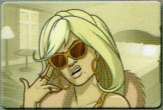
Ilene Dover - Real Estate Agent and Escort: "Check out this backyard!"
Ilene is ready and willing to go the distance. She is a top-performer in and out of the office, always a job well done. She and her brother Ben run a tight ship at the firm. Bottom line... she's a closer.
-
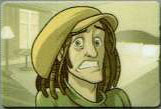
Bud Baker - Supervisor at the local Dispensary: "It's 4:20 somewhere!"
A former coffee barista, Bud finally found his calling as the late-night supervisor at the Hash 'n' Dash Dispensary. Drawing from his past work, he's currently developing his own mixture of caffeine and cannabis, but he's not sure what to call it...
-
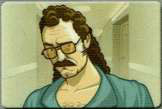
Peter Timberbone - Aging Star: "Timber!"
Back in his prime, Peter was well-known for his use of innovative positions such as the Wheelbarrow and the Butter Churner.
His signature was the line "Timber!" at a scene's money shot. Now, he's downing little blue pills like breath mints just to keep up.
-
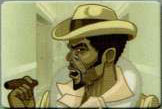
Moe Money - Talent Scout: "Hey player, nice to meet you... I'm the Coach".
With a degree from the School of Hard Knocks, Moe is a very successful mid-level manager. His team is always in line with the company goals...they score the greenbacks!
-

Maryjane Rainbow Paradise Karma - New Age Hippie: "I'm almost always vegan".
'MRPK' has a pocket full of crystals, radiates good vibes and a leaves of strong scent of patchouli in her wake. Maryjane hoops for sport and brews a mean kombucha when she's not practicing yoga.
End of the Game
The game ends when one team has all their words covered. That team wins.
It is possible to win on the other team's turn if they guess your last word instead of one of theirs.
The game also ends if a field operative makes contact with the assassin. That operative's team loses.
Valid Clues
We playtested various rules. Some groups like the rules one way. Some like the rules another way. You should experiment to find out what your group likes.
Some clues are invalid because they violate the spirit of the game.
Your clue must be about the meaning of the words. You can't use your clue to talk about the letters in a word or its position on the table. You cannot tie NIPPLE and NOODLE together with a clue like n: 2 nor with a clue like six: 2. However...
Letters and numbers are valid clues, as long as they refer to meanings. You can use eight: 3 as a clue for BALL, FIGURE, and OCTOPUS.
The number you say after your clue can't be used as a clue. Citrus: 8 is not a valid clue for LEMON and OCTOPUS.
You must play in English. A foreign word is allowed only if the players in your group would use it in an English sentence.
You can't say any form of a visible word on the table. Until CRACK is covered up by a card, you can't say crack or crackdown.
You can't say part of a compound word on the table. Until CAMELTOE is covered up, you can't say camel or toe.
Compound Words
English has three ways to write a compound word. Greenhouse is one word. Pack rat is two words. The mother-in-law is hyphenated. Technically, only greenhouse can be a one-word clue.
You can decide to allow any compound words. However, in no case should a player be allowed to invent compound words. Lunar squid is not a valid clue for MOON and OCTOPUS.
Acronyms and Abbreviations
Technically, CIA is not one word. But it is a great clue. You can decide to allow common abbreviations like UK, lol, and PhD. And words like laser, radar, and sonar are always allowed, even though they originated as acronyms.
Proper Names
Proper names are always valid clues if they follow the other rules. Your group might consider allowing multi-word proper names as valid clues. This would allow full names such as John Holmes or titles such as Good Will Humping.
Even if you don't allow multi-word proper names, you will likely want to make an exception for place names like San Francisco.
Rhymes
Some people like to allow any kind of rhyming clue. If you decide to allow this, just remember that you aren't allowed to indicate you are giving a rhyming clue.
Your operatives will have to figure that out for themselves.
Continue Reading


